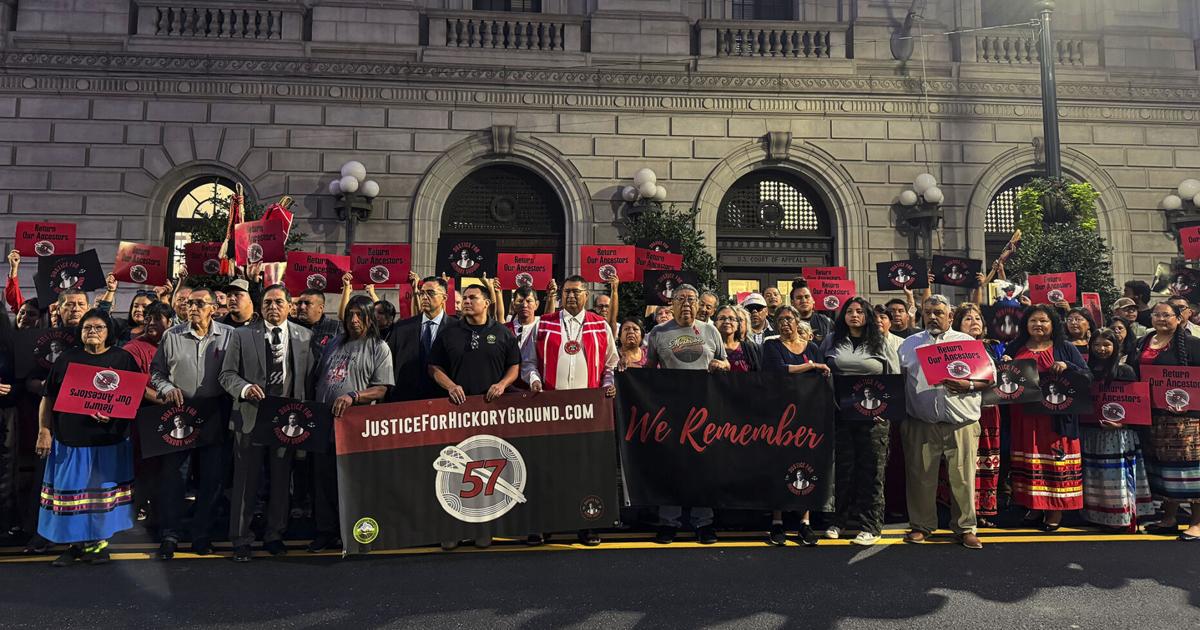The 11th Circuit Court of Appeals has revived a 12-year-old Muscogee Nation lawsuit over a casino that the tribe says was built on sacred burial grounds in Alabama.
The Oct. 11 move by the appellate court vacates a federal judge’s dismissal of the lawsuit in 2021 on the grounds that the Poarch Band of Creek Indians had “sovereign immunity” on the land.
Known as Hickory Ground, the land in question was home to the Muscogee Nation prior to the Trail of Tears. The Poarch Band, which became a federally recognized tribe in 1984 after buying the land, built one of its Wind Creek casinos on the site. The Muscogee Nation in 2012 filed a lawsuit against Poarch officials and the Department of the Interior over the excavation of graves on Hickory Ground.
People are also reading…
Mary Kathryn Nagle, counsel for the Muscogee Nation, said in a press release that the appellate court noted the Poarch band’s only connection Hickory Ground was purchasing the land using federal preservation funds.
“Tribal sovereignty is not a license to destroy the sacred places and graves of other sovereign tribal nations,” Nagle said in a statement.
Poarch Band officials have maintained they protected the site by setting aside the ceremonial ground and another 17 acres for permanent preservation.
The 11th Circuit Court last week directed the lower-court judge to revisit the case with a “claim by claim” analysis into whether the Poarch Band has sovereign immunity that would preclude the lawsuit over Hickory Ground.
Muscogee Nation Chief David Hill described it a “monumental victory for our Nation and for tribal sovereignty as a whole.” He said the decision reaffirms the Muscogee Nation’s sacred and historical ties to Hickory Ground, “while also affirming our sovereign right to seek justice against federal agencies and other entities that violated the laws protecting this sacred land.”
A press release from the Poarch Band states “the Muscogee Nation of Oklahoma is falsely claiming victory in their nuisance lawsuit aimed at taking control of land owned by the Poarch Band of Creek Indians.”
The Muscogee Nation’s legal argument also targets the Department of the Interior, for giving the Poarch Band federal recognition, as well as the National Park Service and Auburn University in Alabama, for their respective roles in exhuming 57 human remains and 7,000 funerary objects from Hickory Ground.
“Poarch argued that we shouldn’t be able to seek repatriation of our ancestors from Auburn University,” said Mekko George Thompson, ceremonial leader of Hickory Ground. “The 11th Circuit ruled otherwise, and now we will finally have our day in court. We will not rest until all our ancestors, stored in plastic bins and boxes, are returned to us for reburial in accordance with Mvskoke law and tradition.”
Robert McGhee, Poarch Creek Indian tribal vice chair, disputed the idea that any remains are being held in storage. He told the Tulsa World “all of the remains in the Poarch Creek Indians possession have been reinterred.”
Nagle told the Tulsa World that Auburn University, through court briefs filed in the case, confirmed that remains and funerary objects remain in storage there.
“The legal action taken against Poarch is based on fiction, not facts,” the Poarch Band said in a press release. “(The Muscogee Nation) seeks to take land that it does not own and to tear down legally built structures that have brought family-supporting jobs to hundreds of Alabamians. This is an attack on tribal sovereignty.”
felix.clary@tulsaworld.com
This story is co-published by the Tulsa World and ICT, a news partnership that covers Indigenous communities in Oklahoma.



